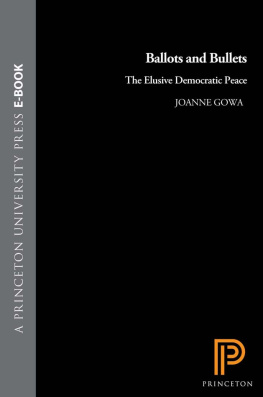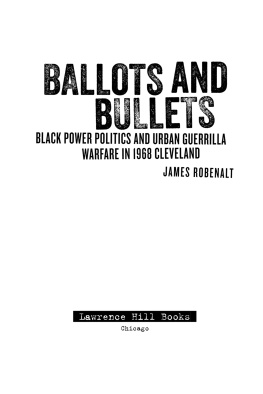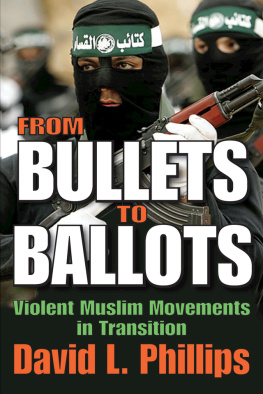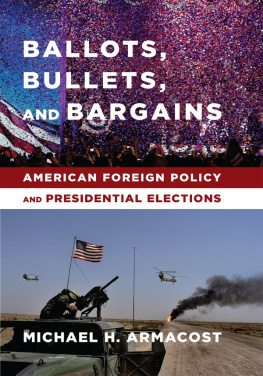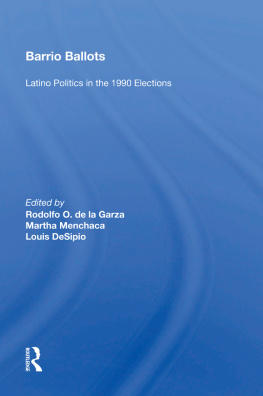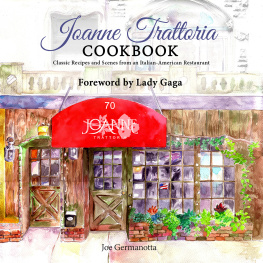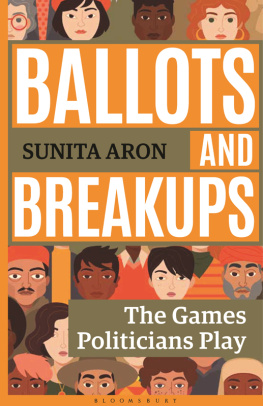Gowa Joanne - Ballots and Bullets
Here you can read online Gowa Joanne - Ballots and Bullets full text of the book (entire story) in english for free. Download pdf and epub, get meaning, cover and reviews about this ebook. publisher: Princeton University Press, genre: Politics. Description of the work, (preface) as well as reviews are available. Best literature library LitArk.com created for fans of good reading and offers a wide selection of genres:
Romance novel
Science fiction
Adventure
Detective
Science
History
Home and family
Prose
Art
Politics
Computer
Non-fiction
Religion
Business
Children
Humor
Choose a favorite category and find really read worthwhile books. Enjoy immersion in the world of imagination, feel the emotions of the characters or learn something new for yourself, make an fascinating discovery.
- Book:Ballots and Bullets
- Author:
- Publisher:Princeton University Press
- Genre:
- Rating:4 / 5
- Favourites:Add to favourites
- Your mark:
- 80
- 1
- 2
- 3
- 4
- 5
Ballots and Bullets: summary, description and annotation
We offer to read an annotation, description, summary or preface (depends on what the author of the book "Ballots and Bullets" wrote himself). If you haven't found the necessary information about the book — write in the comments, we will try to find it.
Ballots and Bullets — read online for free the complete book (whole text) full work
Below is the text of the book, divided by pages. System saving the place of the last page read, allows you to conveniently read the book "Ballots and Bullets" online for free, without having to search again every time where you left off. Put a bookmark, and you can go to the page where you finished reading at any time.
Font size:
Interval:
Bookmark:
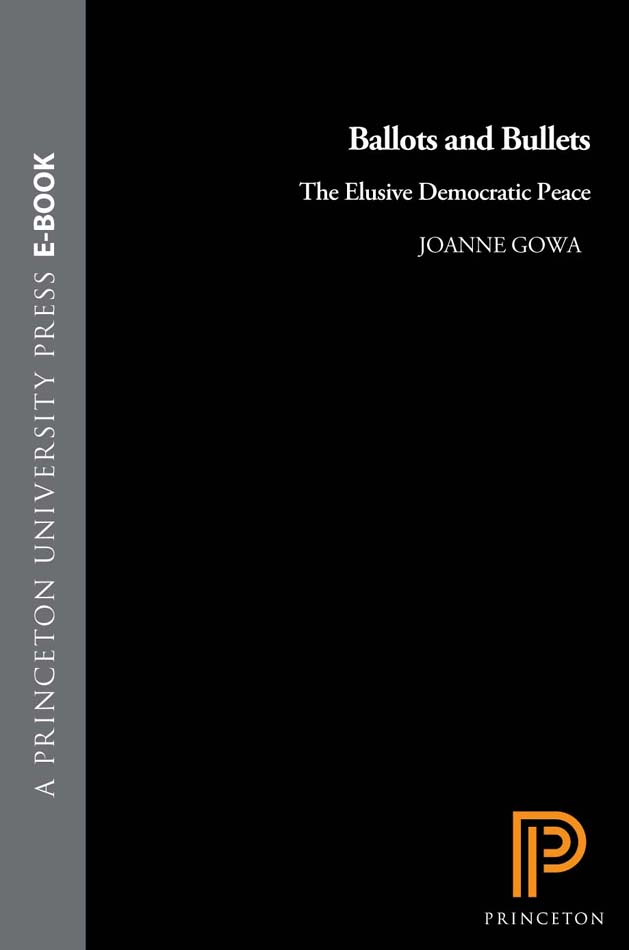
Ballots and Bullets
THE ELUSIVE DEMOCRATIC PEACE
Joanne Gowa
PRINCETON UNIVERSITY PRESS PRINCETON, NEW JERSEY
Copyright 1999 by Princeton University Press
Published by Princeton University Press, 41 William Street,
Princeton, New Jersey 08540
In the United Kingdom: Princeton University Press, Chichester, West Sussex
Library of Congress Cataloging-in-Publication Data
Gowa, Joanne S.
Ballots and bullets : the elusive democratic peace / Joanne Gowa.
p. cm.
Includes bibliographical references (p. ) and index.
ISBN 0-691-00256-8 (cloth : alk. paper)
1. Peace. 2. Democracy. 3. United StatesForeign relations1993 I. Title.
JZ5560.G69 1999
327.101dc21
98-37331
CIP
Published under the auspices of the Center of International Studies
This book has been composed in Galliard
Princeton University Press books are printed on acid-free paper and meet the guidelines for permanence and durability of the Committee on Production Guidelines for Book Longevity of the Council on Library Resources
http://pup.princeton.edu
Printed in the United States of America
1 2 3 4 5 6 7 8 9 10
TO KATIE, JON, AND TIM
FIGURE
TABLES
I NEVER WOULD have begun the work that evolved into this book had it not been for Miles Kahler, the Social Science Research Council, and the University of California, San Diego. On a very cold and gray day in Philadelphia seven years ago, Miles called to ask if I wanted to participate in an SSRC-sponsored conference on liberalization and foreign policy at UCSD. In a split second, I agreed, as the vision of San Diego in March overwhelmed my reluctance to write papers for conferences.
The agenda for the conference sparked my interest in the rapidly growing democratic-peace literature. In the paper I wrote for the March meeting, I examined existing explanations of the democratic peace and found them less than compelling. However, I knew that a serious challenge to the democratic-peace hypothesis required a reanalysis of the existing data.
I turned for help to Henry Farber, a Princeton labor economist with an enduring interest in dispute-resolution processes. Hank has a command of econometric methods and an understanding of data and their limits for which I have acquired a deep respect. Fortunately, he also had the capacity to persist, with his good humor mostly intact, through the series of torturous changes that a parade of reviewers demanded. I could not have produced this book without his help.
I am also grateful to the colleagues and friends who read the entire manuscript and offered very useful, if markedly diverse, suggestions about revising it. James E. Alt, Steve Chan, Gary King, Robert G. Gilpin Jr., Robert O. Keohane, Edward D. Mansfield, Peter J. Katzenstein, and Stephen M. Walt all contributed generous amounts of their talent and time to help make the final version of the manuscript clearer and more complete than earlier drafts.
Individual chapters also benefited from the careful attention of other scholars. Among the latter, I owe more than I can gracefully express to my current and former colleagues in the politics and economics departments at Princeton, who attended what seemed even to me to be an infinite series of seminars on various aspects of the democratic peace. Anne C. Case, Larry M. Bartels, George W. Downs, Mark Fey, Gene Grossman, Keisuke Iida, Peter Kenen, John Londregan, Christina H. Paxson, Thomas Romer, and Howard Rosenthal were indefatigable sources of help. I also received very sound advice on different parts of the manuscript from Robert J. Art, Benjamin J. Cohen, Kurt Gaubatz, Peter Gourevitch, Miles Kahler, David Lake, Lisa Martin, James D. Morrow, Walter Mattli, John S. Odell, Sharyn OHalloran, Robert Powell, Dan Reiter, Bruce M. Russett, and Randolph M. Siverson.
Malcolm Litchfield, the political science editor at Princeton University Press, never once flinched, at least observably, when I missed more than one deadline. Nor did Edna Lloyd cringe when I asked her to check the citations against the references for the first, second, or twelfth time. In a flash, Alan Krueger came up with the title for the book. Jacqueline Berger, Deborah Garvey, and Matthias Kaelberer all provided invaluable research assistance. The Center of International Studies and the Committee on Research in the Humanities and Social Sciences of Princeton University provided financial support for this project, as did a grant for Research and Writing from the John D. and Catherine T. MacArthur Foundation.
Some material from previously published papers appears in this book. I am grateful to the University of Texas Press for permission to reprint parts of Common Interests or Common Polities? Reinterpreting the Democratic Peace (coauthored with Henry Farber), Journal of Politics (vol. 59, no. 2, pp. 393417). I also appreciate the permission of the MIT Press to use parts of three papers: Democratic States and International Disputes, International Organization (vol. 49, no. 3); Politics at the Waters Edge, International Organization (vol. 52, no. 2); and Polities and Peace (coauthored with Henry Farber), International Security (vol. 20, no. 2).
I dedicate this book to my children: Katie, who, from the time she was old enough to sit still, listened patiently as I practiced presenting papers, including those that led to this book; Jon, an always cheerful, willing, and invaluable source of technical support; and Timmy, a computer-literate ten-year-old with an extraordinary capacity to empathize with a recipient of bad reviews.
Joanne Gowa
March 20, 1998
This strategy, it maintains, serves all of Americas strategic interestsfrom promoting prosperity at home to checking global threats abroad (1996, 32). It does so, according to President Clinton, because democracies rarely wage war on one another (1993, 3).
The administrations action finds a sympathetic echo, if not a raison dtre, in much of the recent international relations literature. Based upon multifaceted theoretical foundations and systematic empirical analyses, a series of studies concludes that democratic states are much less likely to engage each other in serious conflicts than are other states.
More specifically, these studies find, democratic states do not wage war against other democratic states. Most students of what has become known as the democratic peace also agree that democratic states are much less likely than are other states to engage each other in serious disputes that involve recourse to force short of war. The number of studies that supports these findings has led Jack Levy to observe, and many others to concur, that the democratic peace is as close as anything we have to an empirical law in international relations (1989, 270).
In this book, I reexamine both the analytic and empirical foundations of the democratic-peace hypothesis. I find that a democratic peace exists only during the Cold War. No evidence of a democratic peace is apparent before World War I. I conclude that an explanation based on shifting interests is more consistent with this dispute-rate pattern than is an explanation based on common polities. Thus, for example, the advent of relative peace between democratic states after 1945 can be interpreted as a product of the interest patterns that the advent of the Cold War induced.
Font size:
Interval:
Bookmark:
Similar books «Ballots and Bullets»
Look at similar books to Ballots and Bullets. We have selected literature similar in name and meaning in the hope of providing readers with more options to find new, interesting, not yet read works.
Discussion, reviews of the book Ballots and Bullets and just readers' own opinions. Leave your comments, write what you think about the work, its meaning or the main characters. Specify what exactly you liked and what you didn't like, and why you think so.

